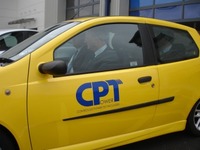MEP welcomes low-cost driver-friendly clean car technologies
 The development of low cost CO2-reducing vehicle systems by Controlled Power Technologies (CPT), whose low carbon technical innovations enhance rather than detract from the driving experience, have been applauded by Malcolm Harbour, a Conservative Member of the European Parliament for the West Midlands and vice-chairman of the European Parliament’s science and technology policy unit.
The development of low cost CO2-reducing vehicle systems by Controlled Power Technologies (CPT), whose low carbon technical innovations enhance rather than detract from the driving experience, have been applauded by Malcolm Harbour, a Conservative Member of the European Parliament for the West Midlands and vice-chairman of the European Parliament’s science and technology policy unit. “The direction of this work is crucial, its funding is important and we need to do everything we can to encourage more technology companies like this one,” said Harbour, a qualified engineer with wide experience of the automotive sector and a member of the CARS21 (Competitive Automotive Regulatory System for the 21st Century) High Level Group, established by the European Commission to develop an integrated strategy for the industry.
Following a drive of demonstrator vehicles equipped with a fast-acting electric supercharger and ultra-reliable and near-instantaneous stop-start system, both featuring highly efficient and controllable electric motor technology, he added: “With all the attention being given to the world slump in car sales, it’s good to see that behind the scenes the development of new technology is alive and kicking in the UK’s automotive heartland. Affordable technology is much needed by the global motor industry to help reduce fuel consumption and carbon emissions, but it has to work without destroying the driving experience; what really impresses me about CPT is its application of high level engineering skills to deliver green vehicles that motorists will want to drive without detracting from the driving experience.”
During the visit to the company’s new technical facility in Coventry, CPT chief executive Nick Pascoe discussed with the MEP the development of smaller more efficient engines, which driven by tighter emissions legislation and new CO2 targets, required micro-hybrid technologies that can also deliver a no-compromise driving experience.
“We have combined robust electric motor technology with affordable state-of-the-art electronics that use current vehicle electrical and control systems to achieve a better driving experience, whilst also reducing fuel consumption and CO2 emissions,” said Pascoe. “The electric supercharger boosts the engine’s performance at low engine speeds without any ‘turbo lag’, allowing a smaller engine and higher gearing to be part of the vehicle’s specification, whilst giving the vehicle a big engine feel. Small engines and higher gearing both reduce fuel consumption and carbon emissions, but the real issue when downsizing engines is that drivers must feel confident that they can still keep up with the flow of traffic.
“Similarly, the CO2 benefit of stopping an engine while the vehicle is stationary is obvious, but the re-start must be near instantaneous for drivers to be confident that the engine will be running when, for example, the traffic light turns green and they immediately want the vehicle to move. Our stop-start motor is class leading even with more challenging diesel applications and instils the high level of confidence that the driver rightly demands. Significantly our products can track the further evolution of hybrid vehicles and will complement alternative fuel developments,” he added.
CPT has only recently moved its small team of West Midlands-based automotive engineers into a brand new development facility in Coventry. The Middlemarch technical centre will help the company in its development and application of micro-hybrid enabling technologies, which are designed to make gasoline and diesel powertrains a lot more efficient. The company retains its Westmayne headquarters near Basildon in Essex, where it has extensive test facilities and complementary engineering skills.
CPT was formed just two years ago as a management buy-in funded by private venture capital. It employs a highly qualified team of automotive engineers with expertise in powertrain engineering, power electronics and control software, whose combined experience and skills have been gained through working on micro-hybrid developments and applications throughout the industry. The company is backed by a number of prominent investors specialising in the energy and environmental sectors.
CPT’s designs are all based on direct drive switched reluctance electrical machines; the high volume, high power electronics necessary to use such machines for automotive applications only recently became available when the industry started developing hybrid vehicles. Their main advantages are low cost, high efficiency, excellent dynamic response, resistance to high operating temperatures, and ease of recycling of the standard materials used in their construction. But it is primarily CPT’s understanding of power electronics and control software and how electrical machines can be applied to vehicle powertrains that best defines the company’s area of expertise.
CPT is engaged with a number of vehicle and engine manufacturers and more than a few applications are now moving close to production readiness. The company is also developing collaborations with other global technology leaders to extend the benefits achievable. CPT’s initial automotive product applications are being followed up by a highly advanced exhaust energy recovery system now in the early stage of development.
Further information on Controlled Power Technologies is available at cpowert.com

